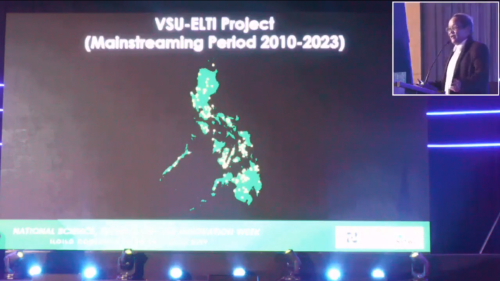
The Department of Science and Technology – Philippine Council for Agriculture, Aquatic and Natural Resources Research and Development (DOST-PCAARRD), in collaboration with the Visayas Consortium for Agriculture, Aquatic and Resources Program (ViCARP), organized a forum with the theme “Creating More Green Jobs through Science and Technology: Towards Sustainable and Empowered Communities” during the National Science, Technology, and Innovation Week (NSTW) in Iloilo City on November 23, 2023.
The forum focused on science and technology initiatives, including rainforestation and vegetable value chains, that can contribute to advancing the country’s green economy. Green jobs refer to employment that contributes to preserving or restoring the quality of the environment, whether in the agriculture industry or the services sector.
Visayas State University OIC President Dr. Daniel Leslie S. Tan expressed in his opening remarks, “This activity is a suitable venue for sharing and exchanging information, knowledge products, and tangible experiences of resource persons. It can inspire others today to replicate and scale up such initiatives, leading to a sustainable community.”
In her inspirational message, Applied Communication Division Director Marita A. Carlos stated, “Today, we are fortunate to listen to updates on science, technology, and innovation that impact the green economy. It is interesting to note that the current government administration has included strategies for creating more green jobs in its Philippine development plan. Hopefully, through this forum, we can contribute to the development of sustainable and empowered communities.”
Dr. Marlito M. Bande of the Visayas State University discussed rainforestation in the Philippines, focusing on sustainability and community empowerment in his lecture. He presented the university’s community-based initiatives in rainforestation in the country and Southeast Asia.
Rainforestation, a strategy to rehabilitate deforested watershed areas using indigenous tree species to preserve rainforest biodiversity while empowering forest resource-dependent communities, has been implemented by the Visayas State University for thirty-three years.
“It started as a research project from 1991 to 2000. We established demo farms and other research farms in Leyte. We mainstreamed these in 2010 until now, with the Environmental Leadership Training Initiative of Yale University,” said Dr. Bande. “This is already implemented all over the Philippines. The strategy here is to conduct training because, as the originator of the technology, the university has no resources to implement it nationally. One of the strategies is to empower, to train, to certify rainforestation trainers all over the country, and they will be the ones to advocate this, and then you will have a domino effect.”
After thirty-three years of implementation, rainforestation has demonstrated that native tree species used in forest restoration could result in habitat restoration, biodiversity conservation, and productivity, community empowerment, provision of stable income to farmer adopters, and high carbon sequestration potential to mitigate global warming.
Dr. Zenaida C. Gonzaga, also from the Visayas State University, discussed in her lecture entitled “Developing Vegetable Value Chains to Meet Evolving Market Expectations in the Philippines” the importance of Good Agricultural Practices (GAP) and the vegetable value chain, with community empowerment among farmers being one of the tangible outcomes.
Dr. Gonzaga’s project has four components: training, food safety, socio-economics, and production. The project aims to improve the capacity of vegetable supply chains in the Philippines to deliver vegetables that better meet consumer expectations in terms of quality, food safety, nutritional value, and price.
“The acceptance of GAP-certified vegetables faces several challenges, including consumers’ limited knowledge of the value of GAP and price sensitivity, which continues to drive the preference for conventionally-grown vegetables over GAP-produced ones,” explained Dr. Gonzaga. “Established GAP-certified businesses have successfully carved out niche markets by creating their own supply chains, a capacity smaller players lack. Lastly, there is a price premium when demand exceeds supply.”
“If interventions fail to translate into monetary incentives, farmers will lack the motivation to engage in the cultivation and sale of GAP-certified vegetables. The capacity to sell certified vegetables is not a valued resource yet in most chains.”
Close to two thousand visitors have toured Dr. Gonzaga’s GAP-certified farm in Visayas from May 2022 to November 2023. Most of these were students on internships, their instructors, and farmers.
The two resource speakers answered audience questions after their respective discussions.
The “Creating More Green Jobs through S&T: Towards Sustainable and Empowered Communities” conference is part of a series of lectures called Techno Fora by the DOST-PCAARRD, covering various topics in the conservation and management of natural resources. (By Jacqueline R. Parairo, DOST-STII)

